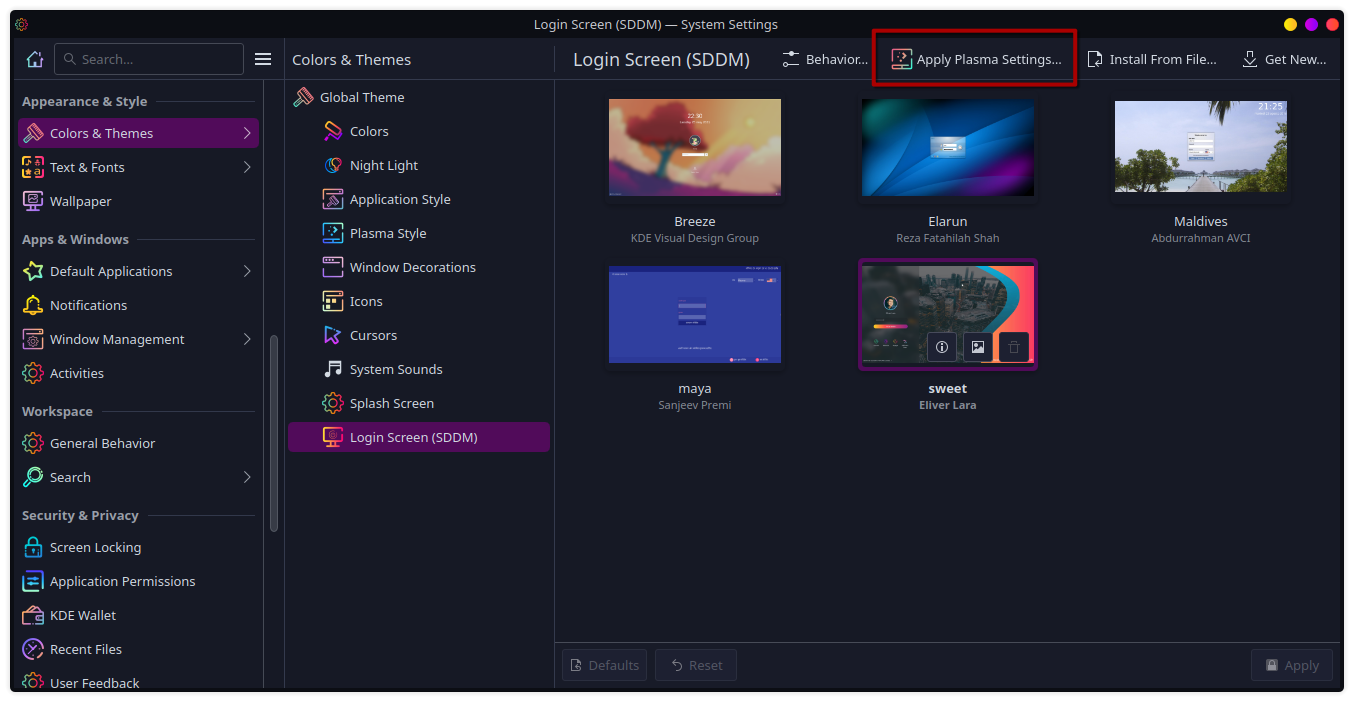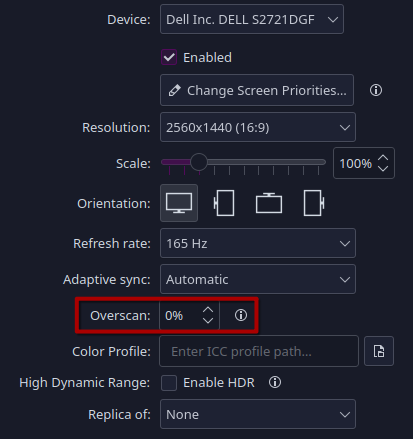I’m using EndeavourOS with KDE.
The display is correctly oriented when logged in but it doesn’t rotate correctly when I’m logged out.
EDIT: corrected the post. This happens when logged out, locking the screen has it displayed correctly.
If you’re using Wayland, you can go to Settings -> Colors & Themes -> Login Screen (SDDM) and click “Apply Plasma Settings…”

If you’re using X11, it looks like you’ll have to resort to hacky scripts, unfortunately.
Source: https://discuss.kde.org/t/how-to-change-monitor-layout-and-orientation-in-sddm/3377
Unfortunately, I’m having to use X11 because of work (context). Thanks for the help!
I suppose xrandr can help you here: See the Arch wiki about xrandr
Oh, I didn’t know that button existed. Great! Even though I just tried it and it didn’t apply my rotation settings correctly.
deleted by creator
Okay grandma, let’s get you to bed
deleted by creator
Yeah that difference in configuration definitely makes it so much better, it completely outweighs the fact that Wayland does proper multi-monitor VRR, fractional scaling, HDR and much more.
Not OP comment but I had no idea Wayland supported all of that. Thanks for sharing! I really need to leave my Linux bubble more often.
And now you know why it’s so funny to read people on the internet exclaiming that X11 is so much better despite its lack of development…
deleted by creator
Literally yes. And you don’t even need to know the exact pixel resolution of the TV.

Edit: Here are the problems with you “Wayland isn’t good enough” people.
First, you don’t use Wayland, so you don’t even know if it’s fixed whatever weird issue you encountered with it before or if it supports a niche use case, for example.
Second, Wayland won’t get good enough for you until you start using it and reporting bugs. You think X11 was a bed of roses when it first started? Or do you think they bumped the version number 11 times for fun?
First, you don’t use Wayland, so you don’t even know if it’s fixed whatever weird issue you encountered with it before or if it supports a niche use case, for example.
Bingo. So many complaints I’ve seen about Wayland have been from Nvidia users who tried it three years ago when the driver support was beyond fucked. I get Linux development moves slow sometimes but holy shit…
deleted by creator
Uh, all that button does is write your configuration to the sddm config. Of course you can also do that manually.
deleted by creator
wlr-randr
You can’t be this stupid, Wayland also uses a config file, you just have a GUI button to copy the configs from inside your session to the login screen. Or do you think the button recompiles the login screen with a different configuration?
Ironically SDDM itself still runs on X11 afaik, Wayland support is still experimental.
I think you have to manually enable it (may depend on your distro/DE) but SDDM works fine with Wayland as it stands now.
In Wayland, the compositor is the window server ( the equivalent of Xserver ). What you are looking for has to be a feature of the compositor and it is.
As others have said below, wlroots based compositors offer wlr-randr. There is also gnome-randr. For KDE, there is Kscreen-doctor. For X ( the window server being used by SDDM here ), there is xramdr.
Now, some people may see it as a problem that we have multiple Wayland implementations. I am mostly not fighting that battle. I will say that I hope these are not the same people that winge about systemd though and push for alternate init systems. I hope nobody that thinks MUSL is cool Is clinging to X11.
I would prefer that there was a common configuration standard for this stuff on Wayland. It will probably come eventually. Maybe as part of the freedesktop.org stuff.
Generally, I believe the Linux ecosystem has been stronger in areas where there has been competition between implementations ( even compilers ). I hope that Wayland will be one of those areas. As the core problems get fixed, the pace of innovation will increase. I believe we are already seeing that. There are more examples every day of things Wayland can do that X11 cannot. Let’s hope for more of that.
deleted by creator
You left a very gracious reply so let’s not fight.
I see a certain amount of irony in the overlap between the group of people ranting that Wayland has too many implementations and the group demanding more implementations of everything else. So that was my point.
Certainly we can agree though that there is nothing wrong with demanding more of both.
One my favourite new distros, Chimera, uses both Wayland and dinit (and Turnstile ).
I am interested to see where the diversity that Wayland provides goes actually. Have you seen this?
deleted by creator
There are more examples every day of things Wayland can do that X11 cannot
What are the examples Wayland can do and X11 cannot?
Not sure if you’re a troll, but if you’re serious, nothing I say is going to change your mind, so I won’t bother.
deleted by creator
I never configured anything on X with a DE, let it be KDE, Gnome or Cosmic, but configure everything with config files I can just copy on sway. It has nothing to do with X or Wayland, but the DE/WM you use.
deleted by creator
Put one hand on the top and one on bottom and rotate the screen by 90° or π/2 radians
If you have to read PDFs regularly having a vertical monitor is a lifesaver.
Rotate the left display 90 degrees clockwise. Now they’re both in landscape. Ta-da!
Sorry, I’ll see myself out.
This is SDDM, the default login manager used by KDE.
The Arch Wiki has an article about it, look under section 2.6.
Great answer!
On the arch wiki for SSDM I found this:
Changes to your display configuration made in a Plasma Wayland session (e.g. monitor layout, resolution, etc) will not persist to SDDM. To make them persist open Plasma’s System Settings and navigate to Startup and Shutdown> Login Screen (SDDM) and click “Apply Plasma Settings…”. You will need to have permission to perform this action.
You should give that a try
From Archwiki > xrandr:
Tip: Both GDM and SDDM have startup scripts that are executed when X is initiated. For GDM, these are in /etc/gdm/, while for SDDM this is done at /usr/share/sddm/scripts/Xsetup. This method requires root access and mucking around in system configuration files, but will take effect earlier in the startup process than using xprofile.
You still use X11?
That’s not the point here but can you share your wallpaper? 😄
I can’t remember where I found it, but here it is. I thought it might be from here (I’ve used these previously) but it is not.
You just need to look at the problem from a different angle
Turn your head
Fix what? It looks perfect /s
Is this when the screen is locked or when you’re logged out? Those are two different things and I suspect it’s the latter. That’s probably sddm and I suspect it can be fixed by using Wayland with it. Should be some option in
/etc/sddm.confor so.I corrected the post, thanks for calling it out! It’s fine when locked but the issue happens when logged out.
Can I have that wallpaper?
https://wallpapersden.com/linux-retro-wallpaper/1336x768/
Edited the photo and used bing search lol
Thank you
Search gruvbox Linux I think I found the light version https://i.pinimg.com/originals/c8/7d/32/c87d329daeef94762661443e3e934246.png
usually monitors can be freely rotated. if yours can’t, the back usually has a square vesa mount on the back and you can just take out the four screws and reattach it the way you like.
I’ve just been logging in upside down for a couple years. My monitor’s vesa Mount is like 3 inches from the top for some reason so having it upside down is the only way I can get a reasonable ergonomic height
Which display manager are you using?
I kinda love this aside from it being unusable














